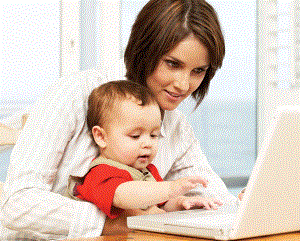
When Lauren*, a mom of 2, posted pictures on her blog of her 4-year old son naked on the beach, splashing in the waves, and building sand castles, she thought she was simply sharing cute images with her readers. But when she noticed there was a search term "naked boy" linked to her blog, she immediately took the pictures down, and started evaluating all the content she shared.
Like most parents, Lauren has only good intentions when she Tweets, blogs or shares things about her children on Facebook- to share her pride and to engage with others. But at what point does the act of sharing our kids' moments threaten their wellbeing and safety, and when do we need to start- or stop- worrying?
Think about it...
It's important to consider the risks that accompany your sharing, whether it be via Facebook, Twitter, blogs or YouTube, warns Johannesburg-based commercial and social media lawyer Paul Jacobson. "In some cases these risks are fairly well known, and in other cases, we can only imagine what they may be. This is one of the challenges of living in a time of such rapid technological change," he says.
In times of such rapid change and given the ease with which we can share pictures and information, it's an important to firstly consider why online privacy is important.
Ask yourself if you want strangers reading stories of your kids throwing tantrums or having learning disabilities. Would you want random people to know your location when you set it on your Facebook or Twitter account? Do you want your address online so that the public knows where your kids are?
And are you comfortable with the knowledge that potential strangers can access pictures of your children, or that your child might get angry one day knowing you posted those nude pics of him as a child? If any of these questions make you unsettled or concerned, perhaps it's time to take preventative and protective steps.
Smart sharing
We're not suggesting you close your Facebook account, stop blogging or delete the pictures you posted of your toddler’s first steps, but there are clever ways to engage in social networking safely, without losing the fun. Paul suggests the following simple steps:
As a starting point, decide for yourself what personal information is most sensitive to you.
This will probably include your identity number, your home address, the location of your children's schools and possibly your home phone number (which can be used to determine your home address, especially if you are listed in the phone book). Do not disclose this personal information online at all or, if you do, disclose it in very controlled circumstances.
One reason for this is that regardless of your privacy settings on services like Facebook, the service provider may change its privacy practices at any time. Another reason is that the service may be hacked and your personal information effectively made public (this has happened with several companies).
Familiarise yourself with the privacy policies that apply to the social network services you use.
Many of these services have user-friendly guides to their privacy policies and, like Google and Facebook, go so far as to publish guides for parents explaining how the services handle children's personal information.
While your children may be too young to use Facebook, each time you publish a photo, a video or some information about your children, you're publishing some of their personal information, so it's important that it can only be accessed by people you trust. Take some time to understand the options available to you, whether you're using Facebook. Google+, your blog or another social media platform.
Take a look at settings that determine who may tag photos of you and your family.
You can't always control who shares content about you and your family but some services allow you to prevent anyone identifying you and your family in that content using facial recognition tags or simply text tags. It may not stop a photo of you going up, but it will help you stop unwanted tags, which helps keeps you a little more anonymous in uncertain circumstances.
On Twitter, posts are public unless your profile is set to private.
That means any tweets and their associated content will be public too. Take into account the fact that embedded in your photos may be specific location data, so you could be potentially disclosing your home locations each time you publish a photo publicly.
When it comes to sharing videos on services like YouTube, take a look at the sharing options available to you.
YouTube, for example, allows you to share videos only with specific contacts or people who have a secret link to the video file. This enables you to control who sees the video.
If you use your location-aware services such as FourSquare and Facebook, consider checking in only once you leave.
Also, ask yourself if it's necessary to check in at your home – it only allows people to know where you are.
While the internet is a place of sharing, caring, comments and likes, it poses risks, but these can largely be curbed. As with your own health, prevention is better than cure, so take preventative steps to ensure your online wellbeing through clever clicking.
*Name has been changed




 Publications
Publications
 Partners
Partners










